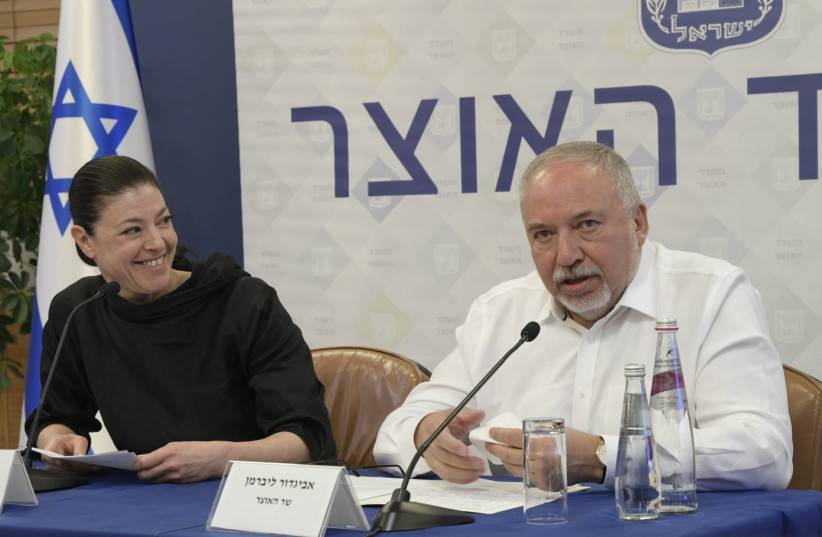As all Israelis are painfully aware, the country is quite literally stuck in a traffic jam. But Israel is also stuck in a figurative gridlock. Over the past few years, the lives of Israeli citizens have been disrupted by one man, who is fleeing his trials and is attempting, in every way, to obstruct the state’s systems.
Citizens who are upset about the spending of NIS 2.4 billion on the upcoming November 1 elections should not be deceived into thinking that the opposition is working earnestly for the public good: It is working in the interests of Benjamin Netanyahu, the leader of the opposition.
Let us look, for example, at the Metro Bill. The traffic jams that afflict greater Tel Aviv have become one of Israel’s most acute problems. To address the causes of this chronic congestion, the government decided to turn words into policy, and after years of promises made by its predecessors, launched the largest infrastructure project in the country’s history of Israel, at a cost of NIS 200 billion.
While many European cities have operated metro railways since the late 19th and early 20th centuries, Israel’s metropolises still lack underground mass transit systems. The project is no less than historic.
The planned metro project stretches out across the whole of the Dan Region, from Rehovot in the south to Hod Hasharon in the north, and it is designed to offer a real solution to the chronic problem of traffic, as well as to housing and employment issues. The projected benefits from this national project are estimated to surpass NIS 420 billion, and some NIS 25 billion per year.

The Metro Bill was a flagship initiative for Finance Minister Avigdor Liberman. It successfully passed its first reading in the Knesset and was put up for debate before the Knesset’s Special National Infrastructure Projects Committee.
But then the opposition stepped in. Those who believed there could be no reason to sabotage such an important bill, one that serves the citizens of Israel, irrespective of what side of the political spectrum they are on, were proved to be mistaken. At the National Infrastructure Projects Committee, the opposition caused a gridlock by submitting endless reservations leaving it stuck in committee, waiting for approval.
Liberman, who understood that soon the bill would be lost, together with an investment of billions of shekels, fought to save the bill, turning to every faction, including coalition factions that were showing signs of giving up and pleaded with them to put politics aside.
Trying to pass the bill
AFTER THE bill finally made it through the National Infrastructure Committee, Liberman made a desperate attempt to push the bill through second and third readings in the Knesset on the eve of parliament’s dissolution, pleading with opposition factions to put politics aside and telling them that a vote against the bill was a vote against the citizens of Israel.
“This is not about opposition and coalition, or religious or secular, or Left and Right. This is the most important infrastructure project in the history of the State of Israel, and it is being sacrificed on the altar of political interests,” Liberman said.
Even now, as Israel heads to elections, Liberman is asking the Knesset to convene to approve the bill, yet without the opposition’s cooperation, it seems this will not happen.
At first, it seemed as if the opposition, having achieved its goal of toppling the government, had decided to support the bill. But then it changed course again, making new, bizarre demands that had nothing to do with the interests of Israel’s citizens.
Just a few examples to illustrate the point. The opposition said it would consider voting for the Metro Bill if Yamina, headed by former prime minister Naftali Bennett, would revoke Chikli’s rebel status – a move that would have enabled him to run with the Likud party in the next elections.
Or, consider a demand to increase election funding to NIS 1.66 million shekels per MK.
MK Yoav Kisch (Likud) went a step further. He said he would be prepared to pass the Metro bill only if the coalition would be willing to bring forward elections by a week, as this would boost the Likud-led bloc’s chance of winning more votes because yeshiva students will be home on holiday that week.
Could the opposition’s demands be any more effective in highlighting its priorities, which clearly put the national interest second to its political interests?
And now, Israel is, once again, heading to elections for the fifth time in three-and-a-half years, and it’s not only its roads that are at a standstill: Israelis can no longer bear the endless gridlock in the political system. They deserve a sane and functioning country, and leaders who place the public interests before their personal and political interests.
When Israelis ask themselves “Are these elections necessary?” and “What could have been done with the NIS 2.4 billion shekels that they will cost?” they would do well to remember the story of the Metro bill.
The writer is a publishing expert at The MirYam Institute. She is a former Knesset member on behalf of the Yisrael Beytenu party and served as the deputy head of the Kiryat Tivon Regional Council. She is a former journalist.
